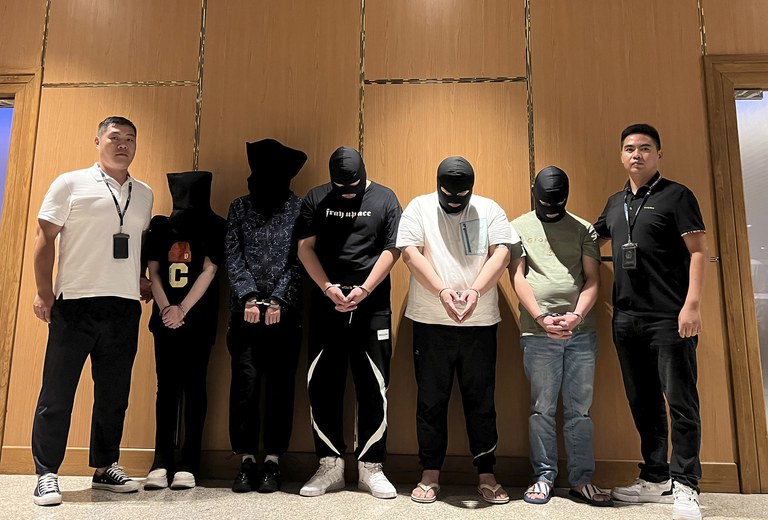The year 2023 has been one of disorder in Southeast Asia.
War is still raging in Myanmar, where perhaps thousands of civilians were killed this year, on top of hundreds more soldiers and anti-junta fighters. ASEAN, the regional bloc, has failed yet again to either bring the warring parties to the negotiation table or, as a result, take a sterner position on the military government that took power through a coup in early 2021.
A consequence of the escalation of political violence in Myanmar has been the proliferation of crime. According to the Southeast Asia Opium Survey 2023, published by the United Nations Office on Drugs and Crime (UNODC), the country reclaimed the spot as the world’s biggest opium producer, with the area of land used to grow the illicit crop increasing by 18 percent to 47,100 hectares in 2023, compared to the previous year.

The report noted that “although the area under cultivation has not returned to historic peaks of nearly 58,000 ha (143,300 acres) cultivated in 2013, after three consecutive years of increases, poppy cultivation in Myanmar is expanding and becoming more productive.”
At the same time, production of methamphetamine has also increased. One result has been to flood the rest of Southeast Asia with cheap drugs. On Dec. 13, the Thai police seized 50 million methamphetamine tablets near the Myanmar border, the country’s largest-ever drug bust and the second largest in Asia.
Alastair McCready, reporting for Al Jazeera in November, noted that yaba pills—combination of methamphetamine and caffeine—are selling for US$0.24 cents each in Laos.
The flood of drugs has led to an explosion of other criminal activity. Radio Free Asia has reported on the growing anger of ordinary Laotians about the authorities inability to investigate even petty crimes, which has been compounded by the ongoing economic crisis in the communist state, another indication of the disorder now infecting the region.
Enter ‘scam states’
Singapore, after staying capital punishments for years, felt it necessary to begin state-enforced executions again, killing the first woman defendant in two decades this year for drug-related offenses.
If Myanmar has the distinction of becoming Southeast Asia’s “narco-state” once again, some of its mainland neighbors now have the reputation of being what could be called “scam-states.”
The blockbuster Chinese hit of the year No More Bets—a film about unwitting Chinese youths being lured into working for scammers somewhere in Southeast Asia, whereupon tragedy unfolds—was banned by several Southeast Asian governments, including Cambodia’s, which presumably thought its “ironclad” friend was spreading malicious propaganda.

Indeed, if in China No More Bets was a Tarantino-esque public health warning, in Southeast Asia it was an alarming indictment of all that’s wrong in their nations, a held-aloft mirror they couldn’t ignore, hard as they tried.
The Office of the UN High Commissioner for Human Rights reported in August that at least 120,000 people in Myanmar and 100,000 in Cambodia “may be held in situations where they are forced to carry out online scams.” According to a UNODC report, there could be “at least 100,000 victims of trafficking for forced criminality” in Cambodia alone. “If accurate,” the report added, “these estimates of trafficking for forced criminality in Southeast Asia would suggest that this is one of the largest coordinated trafficking in persons operations in history.”
Note that those numbers are only of people forced to work in Southeast Asia’s scam compounds, which stretch from mainland Southeast Asia to Malaysia and the Philippines. The number of workers who choose, however you understand that word, to work in this industry is no doubt many times higher.
Half of national GDP
The UNODC was more hesitant in its language than it could have been. It offered a “conservative estimate” that the scam industry of one Mekong nation, which it did not name, “may be generating between $7.5 and $12.5 billion” in revenue annually, around half that country’s official GDP in 2021.
Some think it was a reference to Cambodia, whose GDP was US$27 billion that year. My guess is that the UNODC was being vague because it knows this estimate could also apply to Laos and Myanmar.

Moreover, it’s possible that online scamming, with its associated human trafficking and money laundering, might now be the most profitable industry in all three states, and this increasingly un-shadowy sector may be worth as much as the entire GDP of all three states.
To quote the UNODC report: “the scam industry is earning criminal groups the equivalent of billions of U.S. dollars, with profits rivaling the GDP of some countries in the region.”
There have been some busts in Cambodia and the Philippines. One of the sparks for the “Operation 1027” offensive that unfolded in October across northern Myanmar, touted as the biggest rout of the junta’s forces since the February 2021 coup, was the apparent inability of the military junta to tackle Chinese-run scam compounds in Shan State. Because of the junta’s inactivity, a number of armed ethnic groups stepped in to tackle the scam compounds, which was well received in Beijing.
However, the task of tackling these groups is beyond the capabilities of the police and militaries of Southeast Asian states. In authoritarian mainland Southeast Asia, law enforcement is a patronized, pay-for-promotion extension of ruling parties, which makes them not only ineffective but also systematically corrupt.
Political protection
Naturally, there is a good deal of political protection of these vast scam syndicates. Quite obviously, one doesn’t build an industry worth as much as half a country’s GDP without the active participation of a section of the ruling aristocracy. Li Kuong, the alleged owner of a scam compound in Cambodia, was made a neak oknha, one of the country’s highest honorific titles, in June.
In Laos, does the long-ruling Lao People’s Revolutionary Party control Bokeo province or is it now the fiefdom of the Chinese criminal tycoon Zhao Wei, who runs the province from its de-facto capital city, the Golden Triangle Special Economic Zone?
Which brings us to corruption. This year, the Vietnamese Communist Party’s anti-graft investigators arrested dozens of senior officials and businesspeople related to the case of a prominent real estate developer who allegedly embezzled nearly US$12.4 billion, the equivalent of more than 3 percent of the country’s GDP.
For some moments in 2021 and 2022, at the height of the COVID-19 pandemic, a notion gained traction that authoritarian states are more able than their democratic cousins at ensuring stability, order and prosperity. Events in 2023 in Southeast Asia showed the opposite.
Communist Vietnam has just uncovered perhaps the biggest corruption scandal in the region’s history—and there may be worse to come. Crime rates are spiraling out of control in communist Laos, whose economic crisis is unlikely to end next year, suggesting that authoritarians are not trustworthy guardians of economic growth.

Myanmar, the region’s “narco-state”, is engulfed in a war created by a military junta that traces its lineage to previous military regimes that called themselves the State Law and Order Restoration Council or State Peace and Development Council.
Cambodia, Laos and Myanmar could possess illegal scam industries worth as much as half their national GDPs, effectively making them “scam-states,” where the government, judiciary and military appear to have been effectively infiltrated by scam syndicates.
Does all this sound like the sort of stability and orderliness that authoritarians say justifies their monopoly of power?
David Hutt is a research fellow at the Central European Institute of Asian Studies (CEIAS) and the Southeast Asia Columnist at the Diplomat. As a journalist, he has covered Southeast Asian politics since 2014. The views expressed here are his own and do not reflect the position of Radio Free Asia.



